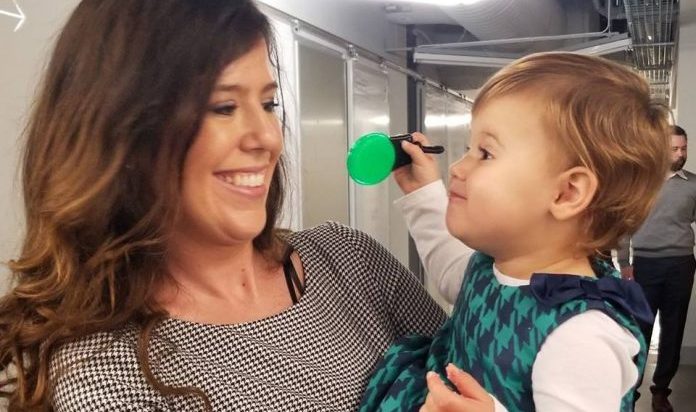5 Essential Tips for Thriving in a Coding Boot Camp, from a Mother Who’s Been There

Megan Anthony initially liked her job as a community manager for a tech industry co-working space. Once her daughter was born, however, working long hours on-site wasn’t so appealing.
“After I became a mom, work I used to enjoy was no longer fulfilling. The hospitality industry isn’t very family-friendly,” said Megan. “There wasn’t a lot of flexibility when it came to my schedule—not to mention the income potential was limited. I knew I needed to make a significant career change, and fast.”
Working with web developers had sparked her interest in coding—and made her acutely aware of the need for more women in the field. Determined to build a new career, she enrolled in the Penn LPS Coding Boot Camp. Just eight months later, she landed a position as a junior software engineer with Comcast.
“I feel like a whole new person now that I’ve completed this boot camp,” said Megan. “I feel as if my career possibilities are endless.”
Many parents with young children have successfully completed tech boot camps and, like Megan, have gone on to land rewarding, lucrative jobs they love. That said, juggling the responsibilities of parenthood with the demands of boot camp isn’t for the faint of heart. Here are Megan’s top five tips for any parent considering taking on the challenge.
1. Be clear about your priorities
It goes without saying that your kids, your friends, and your job are important. But boot camp may require shifting some priorities.
“If you’re serious about making a big career change, you need to dedicate a lot of time to the homework,” Megan said. “Before I started the program, I did a time-management exercise that required me to map out exactly how many hours I would have to study. I thought I’d have 20–25 hours a week, but it turned out I’d only made room for 10 hours! That would not set me up for success. I had to plan better.”
Megan knew that taking care of her 15-month-old daughter and attending a full-time program wouldn’t be feasible for her. Instead, she gave the part-time boot camp her all—putting her on the fast track to her new career.
2. Keep the long game in mind
Asking her husband to be the sole breadwinner for several months so Megan could go back to school wasn’t easy. “He initially thought my interest in coding was just a hobby, not a potential career,” she said.
Her approach? She did some research, ran the numbers, and made a Powerpoint presentation for him to review.
“I wanted to make this change, and I needed him to understand why my taking time off from earning a paycheck would be worth it,” said Megan. Now that she’s completed the program and landed a great job, it’s obvious to both her and her husband that making the investment in the boot camp was the right choice. “In the short-term, it wasn’t always great. In the long-term, it’s amazing.”
3. Speak the language
Transitioning between the worlds of toddlers and technology, Megan occasionally struggled with imposter syndrome.
“I didn’t feel worthy of using the vocabulary for what we were learning—terms like recursion, algorithms, Big O notation, and so on. I was afraid people would think I was just a mom who would never make it through boot camp,” said Megan.
With the help and support of her instructor, fellow participants, and TAs, Megan was able to get past her fear—and learn a valuable career skill.
“Communication is paramount in web development. You’re constantly asking questions, and if you’re not using the correct terminology, your mentors and supervisors won’t be able to understand the issues you’re having,” Megan said. “I had to tell myself, ‘You’re a developer now. Own it.’”
4. Build your network
One of Megan’s favorite things about boot camp was the friendships she made along the way.
“Attending boot camp is an arduous process; it can be hard for your friends and spouse to relate,” she said. “You need to find people who are on the same journey and who can sympathize and celebrate with you.”
Having a mentor was also a huge bonus for Megan.
“My mentor helped me tremendously when I started job-hunting,” she said. “He helped me understand what my interviewers were looking for in a junior developer, and explained why my code worked—or why it didn’t.”
Besides providing emotional support and companionship, a network of peers and mentors can give you a leg up with potential employers. “I got a lot of interviews because of my connections and rapport with the community,” said Megan.
5. Take time for yourself
“Making a transition like this can be hard,” said Megan. One of the ways she coped with the dual pressures of parenthood and her studies was to take time for herself—chatting with friends or watching her favorite TV show.
“Whatever it is, if it helps you relax, do it. You need to take care of yourself so you can care for everyone else,” Megan said. “You’ll retain more if you aren’t stressed when you’re studying, and you’ll be more engaged as a parent.”

 Live Chat
Live Chat